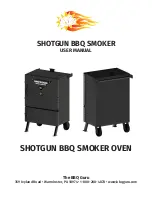
2
If You Smell Gas
• DO NOT
turn electric switches on or off
• DO NOT
smoke
• DO NOT
use naked flames
•
Turn off the gas at the meter or cylinder
•
Open doors and windows to get rid of the gas
•
Keep people away from the area affected
•
Call your gas supplier
• If you are using Natural Gas in the UK, ring the
National Grid on: 0800 111 999
Peculiar Smells
When you first use your cooker it may give off an odour. This
should stop after use.
Before using for the first time, make sure that all packing
materials have been removed and then, to dispel
manufacturing odours, turn the ovens to 200 °C and run for at
least an hour.
Before using the grill for the first time you should also turn on
the grill and run for 30 minutes with the grill pan in position,
pushed fully back and the grill door open.
Make sure the room is well ventilated to the outside air
(see ‘Ventilation’ below). People with respiratory or allergy
problems should vacate the area for this brief period.
Ventilation
The use of a cooking appliance results in the production
of heat and moisture in the room in which it is installed.
Therefore, make sure that the kitchen is well ventilated:
keep natural ventilation holes open or install a powered
cookerhood that vents outside. If you have several hotplates/
burners on, or use the cooker for a long time, open a window
or turn on an extractor fan
Maintenance
•
Only a qualified service engineer should service the
appliance and only approved spare parts should be
used. It is recommended that this appliance is serviced
annually.
•
Before replacing the bulb, turn off the power supply and
make sure that the oven is cool.
• DO NOT
use cooking vessels on the hotplate that
overlap the edges.
•
Unless specified otherwise in this guide, always allow
the appliance to cool and then switch it off at the mains
before cleaning or carrying out any maintenance work.
• DO NOT
use the control knobs to manoeuvre the cooker.
• NEVER
operate the cooker with wet hands.
• DO NOT
use a towel or other bulky cloth in place of a
glove – it might catch fire if brought into contact with a
hot surface.
• DO NOT
use hotplate protectors, foil or hotplate covers
of any description. These may affect the safe use of
your hotplate burners and are potentially hazardous to
health.
• NEVER
heat unopened food containers. Pressure build
up may make the containers burst and cause injury.
• DO NOT
use unstable saucepans. Always make sure that
you position the handles away from the edge of the
hotplate.
• NEVER
leave the hotplate unattended at high heat
settings. Pans boiling over can cause smoking,
and greasy spills may catch on fire. Use a deep fat
thermometer whenever possible to prevent fat
overheating beyond the smoking point.
•
Unattended cooking on a hob with fat or oil can be
dangerous and may result in fire.
• NEVER
leave a chip pan unattended. Always heat fat
slowly, and watch as it heats. Deep fry pans should be
only one third full of fat.
• NEVER
try to move a pan of hot fat, especially a deep fat
fryer. Wait until the fat is cool. Filling the pan too full of
fat can cause spill over when food is added. If you use a
combination of oils or fats in frying, stir them together
before heating, or as the fats melt.
•
Foods for frying should be as dry as possible. Frost on
frozen foods or moisture on fresh foods can cause hot
fat to bubble up and over the sides of the pan. Carefully
watch for spills or overheating of foods when frying at
high or medium high temperatures.
• DO NOT
use the top of the flue (the slot along the back
of the cooker) for warming plates, dishes, drying tea
towels or softening butter.







































